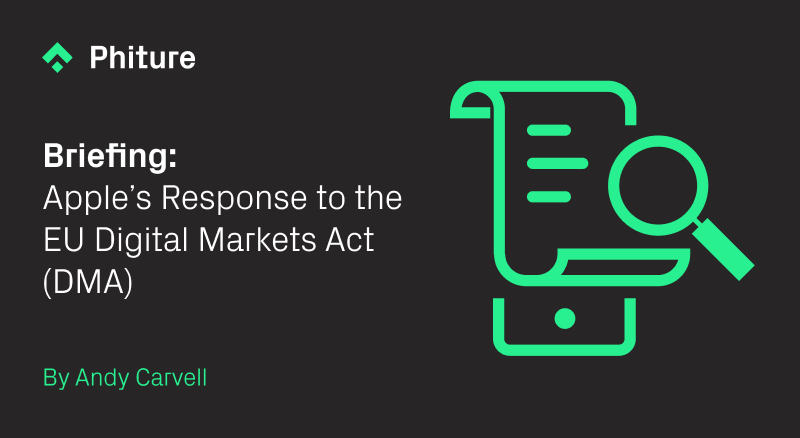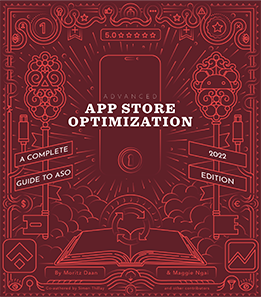First prepared by the Phiture team for clients and partners, we’re now publishing our take on Apple’s response to the EU Digital Markets Act (DMA) publicly.

Update 03/29/2024: The European Commission has now launched investigations into Apple, Google, Meta, and Amazon for potential non-compliance with the Digital Markets Act (DMA), with possible heavy fines for violations. As a result of these investigations, we expect to see further changes to Apple’s policies and will keep this briefing up to date to reflect those in the future. Read more here: The Verge
For app publishers who choose to opt in to enable alternative distribution and payments, Apple’s recent proposed changes in response to the EU Commission’s Digital Markets Act (DMA) mark a significant shift in its app distribution and payment processing policies.
The DMA aims to promote competition by imposing restrictions on “gatekeeper” companies (including but not limited to Apple and Google) that operate at a certain scale.
Regarding app store usage, the DMA stipulates two important requirements for gatekeepers: one, allowing alternative in-app and out-of-app payments, and two, enabling the installation and use of third-party software applications or application stores.
Google’s compliance with the DMA focuses more on alternative payments. This is because Android is a more open platform that has supported sideloading and alternative app stores on many iterations of its devices since it was first released. Google introduced user choice billing in 2022, which allows developers to offer alternative payment methods, but still charges a reduced platform fee on those transactions.
Apple’s compliance with the DMA is more complex because it must support alternative payment methods as well as alternative app stores.
Apple has introduced new business terms in the EU that give developers a choice. They can either abide by existing App Store policies or opt into new terms that allow them to utilize alternative app stores and billing methods under different commercial conditions. Under these new terms, developers will pay reduced commission fees for payments made through their apps distributed from the App Store. They will also pay a payment processing fee if they use Apple’s native in-app payments process but no fee if they use alternative providers or accept payments via an external website link. Additionally, all developers who opt into these new terms will be obligated to pay a Core Technology Fee (CTF) for every first annual install of their app above 1 million generated from either the App Store or an alternative app marketplace.
There is no deadline to enter the new business terms, and developers are encouraged to take their time to decide on what is best for them, as once they sign the addendum to change the agreement, the new terms will apply to all apps in the account, and developers can’t go back to the previous business terms.
Summary of Apple’s changes in response to the DMA
- New (opt-in) business terms, which unlock alternative app distribution
These include a reduced commission on App Store transactions, an optional payment processing fee for using Apple’s system, and a highly contentious Core Technology Fee for apps distributed from the App Store or alternative marketplaces. This fee is €0.50 for each first annual install over a 1 million threshold on iOS in a 12-month period and includes first-time installs, re-installs, and app updates by iOS users with accounts from the 27 EU countries. - Apple introduces a new set of business terms for app distribution and monetization, offering developers two options:
Stick with the existing App Store policies, with no changes, or adopt the new terms to access alternative app stores and billing methods under revised commercial conditions.


Source: mobiledevmemo.com / Eric Seufert - Alternative app distribution and payments
Developers can now distribute their iOS apps outside the App Store and use alternative payment processors within their EU apps across Apple’s operating systems.
This could lead to an increase in reach, but costs associated with the new business terms are significant. - Enhanced user protections
Apple will introduce new safeguards to minimize risks associated with sideloading and alternative payment processing. These include notarization for iOS apps, authorization for marketplace developers, and disclosures on alternative payments.
These safeguards are good news for both developers and consumers. - EU-specific adjustments
Apple will allow EU iPhone users to select a default web browser and contactless payments app, potentially bypassing Apple Pay.
This could be interesting for e-commerce apps and others that wish to drive off-platform purchases while still distributing their app through the App Store.
Phiture’s take
- Apple has worked hard to make both side-loading/3rd party stores and alternative payment methods commercially unattractive to app developers. As Eric Seufert coined it: Apple is playing “Heads I win, Tails you lose” in what amounts to an attempt at malicious compliance.
- Only very high average revenue per unit apps currently look like potential winners from accepting the new terms.
- It’s still very early days, and Apple’s current response is just a proposal
- Regulators will review the proposal, along with those from other gatekeepers, starting March 7, 2024.
- Apple may be required to modify its offering based on this review.
- Aside from Epic, who have a well-documented ‘beef’ with Apple, we haven’t seen many developers showing enthusiasm about the chance to take Apple up on their new terms.
- The proposed new terms are not available to opt into yet: this is all still somewhat theoretical as of today (Jan 31, 2024).
- It’s not a one-size-fits-all situation: Factors such as reach, development effort, revenue model, user base size, and other fees/charges incurred all need to be considered when deciding which model is best for your app.
- Phiture expects other gatekeepers such as Microsoft – and possibly Amazon – to mull creating their own iOS app stores, which could significantly boost the reach of apps in the EU that opt into Apple’s new business terms.
- Some niche-audience apps may be able to operate very effective businesses while staying under one million EU installs, but the App Store Small Business Program already offers a reduced 15% fee, which only drops to 13% under the new terms. However, this ties developers into the €0.50 Core Technology Fee once they hit one million EU installs: this fee will be a killer for most existing app business models.
- Under the current rules, app updates (including updates for users who are inactive but still have the app installed) will be counted toward the ‘installs’ total. This implies that developers will have to pay the CTF annually even for inactive users. The CTF makes the economics very tough for most businesses.

Industry reaction
- Consumer concerns: There’s a mix of opinions among consumers. Some appreciate the EU’s stance on consumer rights while others express concerns about potential security risks and reduced user experience due to multiple app sources.
- Regulatory compliance questions: There are uncertainties about whether Apple’s restructuring will comply with the DMA as the act requires fair, reasonable, and non-discriminatory conditions for access to app stores. The introduction of the CTF and Apple’s new business terms are central to this debate.
Further Reading
- Apple’s official announcement and business terms changes link
- Mobile-centric analysis from renowned industry commentator Eric Seufert link
- Mobile-centric analysis of Apple’s DMA response from the leading mobile measurement platform, Appsflyer link
- Explanation of the DMA by CookieBot (UserCentrics sub-brand) – less mobile-centric link
- Reuters’ coverage of Apple’s response to the DMA and industry reactions link
- 9to5Mac’s discussion on the new labeling of apps to inform and protect EU users link
- MacRumors’ report on industry opinions and the App Store split link
- TechCrunch’s analysis of Apple’s new ‘core tech’ fee and its implications link
- MacRumours report on Apple’s recent non-compliance with EU rulings (related to Epic Games) requiring Apple to open up distribution to non-Apple store purchases link
- Epic has declared they will launch an app store on iOS, mostly to distribute Fortnite, despite decrying Apple’s “Hot Garbage” EU business rules link
- Developers call out Apple’s ‘malicious compliance’ link
Table of Contents




















